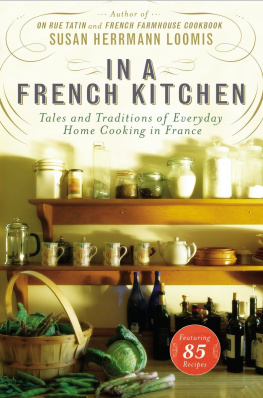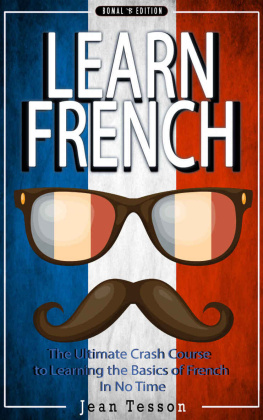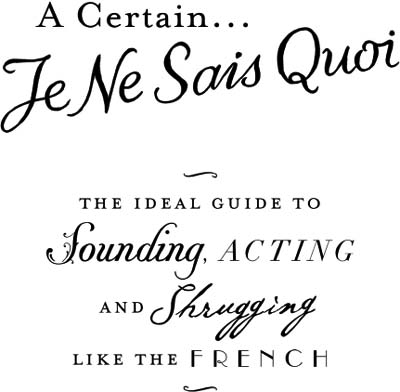When Charles Timoney and his French wife were both made redundant in the same week they decided to try living in France for a year or so. It proved much harder than expected. Charles O-level in French was little help when everyone around him consistently used a wide variety of impenetrable slang and persisted in the annoying habit of talking about things he had never heard of. But they stayed. Two decades and two thoroughly French children later, he decided to write the book that would have saved him from so many blunders and misunderstandings along the way. This is it.

PENGUIN BOOKS
PENGUIN BOOKS
Published by the Penguin Group
Penguin Books Ltd, 80 Strand, London WC2R 0RL , England
Penguin Group (USA) Inc., 375 Hudson Street, New York, New York 10014, USA
Penguin Group (Canada), 90 Eglinton Avenue East, Suite 700, Toronto, Ontario, Canada M4P 2Y3 (a division of Pearson Penguin Canada Inc.)
Penguin Ireland, 25 St Stephens Green, Dublin 2, Ireland (a division of Penguin Books Ltd)
Penguin Group (Australia), 250 Camberwell Road, Camberwell, Victoria 3124, Australia (a division of Pearson Australia Group Pty Ltd)
Penguin Books India Pvt Ltd, 11 Community Centre, Panchsheel Park, New Delhi 110 017, India
Penguin Group (NZ), 67 Apollo Drive, Rosedale, North Shore 0632, New Zealand (a division of Pearson New Zealand Ltd)
Penguin Books (South Africa) (Pty) Ltd, 24 Sturdee Avenue, Rosebank, Johannesburg 2196, South Africa
Penguin Books Ltd, Registered Offices: 80 Strand, London WC2R 0RL , England
www.penguin.com
First published 2009
Copyright Charles Timoney, 2009
Illustrations Vincent Burgeon, 2009
All rights reserved
The moral right of the author has been asserted
ISBN: 978-0-14-193145-6
For my parents
as this fellow is a Frenchman, we all realise that it is only a question of time before something dastardly occurs.
Frenchmans Creek, Daphne du Maurier, 1941
Contents
Acknowledgements
Thanks are principally due to Georgina Laycock and Jane Turnbull how anyone manages to publish a book without them is a mystery to me.
I would also like to thank those who provided support, encouragement, suggestions, ideas and corrections for this book and the previous one, including in no particular order: Peter and Helen, Polly and Mark, Peter and Raija, Siggi and Christine, Batrice and Jean-Franois, Andy Kay for his reviews, and my colleagues, who, wittingly or not, answered all my questions, notably Laurence for les enfants; also Anne for the history, Marc for the sport, Valrie for the cheese, Nathalie for successfully predicting the outcome, Eric and, of course, Ins, Sarah and Sebastian.
Introduction
A few months ago, having tried all sorts of things to cure a sore back, I thought I would go and see a healer.
Much laying-on of hands not only cured my back, it revealed the healer to be something of a medium.
I can feel that at some point in your life you had a long, painful and deeply traumatic experience. Whats more, I can now clearly see that it happened when you were about twenty-eight or thirty, she surprised me by exclaiming while putting the finishing touches to my back.
But what kind of experience could produce internal scars like these? she went on, clearly appalled by the depths of suffering that she had unearthed in one so apparently carefree.
From the dates she gave, it could only be one thing. I remembered it all too well: it had indeed been long, painful and deeply traumatic.
That was the time I came to live in France.
Not wishing you to go through the same traumatic experience, I thought I would share with you here the hard-won knowledge of all those years in France.
In my earlier book, Pardon My French, I gave definitions for various useful words that I wish I had known when I first came to live in France. While those words will help you understand a lot of what you see and hear around you, there is much more that you could usefully know.
I have kept the idea of key words but, rather than just defining them, I have used them in themes to illustrate various aspects of French life: a typical French day, how to get the best out of restaurants and bars, the perils of greeting people, a beginners guide to gesticulating and more.
Pardon My French showed how to unleash your inner Gaul. However, in order to refine your inner Gaul, to enjoy France more and, hopefully, to avoid being spotted as a tourist too quickly, you will need that little extra that certain je ne sais quoi. This book should help you find it.
1. Une journe franaise a typical day
However high your standard of living in the UK may be, there is something which stops you from living the true Good Life. For there is something lacking in your life, a thing that is almost omnipresent in France.
This thing forms an essential part of French daily routine. It marks both the start of the day (which is why we are starting with it here) and also the end of it. Were you somehow able to snap your fingers and make it disappear throughout France, the sense of loss would be overwhelming and, I am convinced, the majority of people would simply not be able to make it through the following day.
But what can this key element of French life be? Wine? Cheese? Sex??
It is something far more important than all of those: I am referring to les volets shutters.
Practically all dwellings in France, from the simplest studio to the most opulent chteau, have windows fitted with shutters. Shutting and, more importantly, opening the shutters is an essential French way of expressing the simple joy of living.
You dont have to take my word for this; you just have to watch French adverts on TV.
Any advert for coffee, or breakfast cereal, or for that most curious of French breakfast drinks, Ricor (a chicory-based milky drink that tastes better than it sounds), starts with an attractive, happy and smiling parent pushing open the shutters to greet a new, sunny day before going to prepare breakfast for their attractive, happy and smiling family.
Of course, shutters come in many guises metal ones that you fold back in sections or plastic ones that you roll up by winding a crank handle that hangs by the window, or an electric version of this which always strikes me as cheating but the real shutter, the true shutter of breakfast adverts is a simple painted wooden pair that you open from the inside and push back simultaneously against the wall. It is, of course, absolutely crucial to smile winningly while doing so or the day will get off to a very bad start indeed.
Opening and closing your shutters should preferably be done at the same time every day. You open them as soon as you are awake, to greet the day and to allow your neighbours to see you in your nightclothes with your face marked by sleep. This is a key moment in their day too. In the evening comes another communal moment: as soon as it starts to get dark, everyone sets about closing their shutters in unison.
The sound of shutters being opened or closed is thus a fundamental feature of communal living in France.
Shutter opening is an example of the ways in which a French day differs from one elsewhere. And now, a kind of appetizer to the rest of the book, I am going to look briefly at a few daily events that seem peculiar to France.
LA COUETTE
Having opened your shutters and smiled cheerfully at the new day, you might reasonably assume that you are now free to go and have your breakfast. Unfortunately, there is one more thing to do first.








